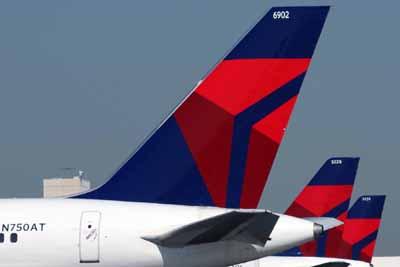
Delta Air Lines will suspend service to 11 domestic non-hub cities, following a decision by the U.S. Transportation Department (DOT) to provide greater flexibility from CARES Act minimum service requirements.
The CARES Act coronavirus stimulus law prevented airlines receiving federal aid from suspending service to most domestic points in their pre-pandemic schedules. On Jun. 2, the DOT issued a final order allowing airlines to cancel service to up to 5% of their domestic networks, provided that all airports retain service from at least one carrier.
The 11 markets that will temporarily lose Delta service are: Aspen, Colorado (ASE); Bangor, Maine (BGR); Erie, Pennsylvania (ERI); Flint, Michigan (FNT); Fort Smith, Arkansas (FSM); Lincoln, Nebraska (LNK); New Bern/Morehead/Beaufort, North Carolina (EWN); Peoria, Illinois (PIA); Santa Barbara, California (SBA); Scranton/Wilkes-Barre, Pennsylvania (AVP); and Williston, North Dakota (XWA). The suspensions will go into effect on Jun. 8.
Additionally, Delta will indefinitely suspend service to Ottawa International Airport (YOW), effective Jun. 21.
“As the world responds to the COVID-19 pandemic, Delta continues to face an unprecedented impact to our business, and suspending operations at these airports will reduce costs where customer demand is low,” Delta SVP for domestic airport operations Sandy Gordon said.
The Atlanta-based carrier will re-accommodate all customers whose travel is impacted by the service suspensions. Affected employees will be provided pay protection options through Sept. 30, the date after which federal CARES Act payroll support expires.
“We will move quickly to work with affected customers, whose patience we sincerely appreciate as we navigate this unprecedented time together,” Gordon added.
Delta’s capacity cuts in the June quarter totaled 85% of its original schedule, consisting of 80% domestic reductions and 90% international.
The airline has restored hundreds of suspended flights in June and July, with plans to operate 37% of its July domestic schedule—more than United Airlines (30%), but substantially less than American Airlines (55%) or Southwest Airlines (60%).
Delta has gone beyond its rivals in ensuring social distancing in the cabin, recently extending 60% load factor caps through Sept. 30. With demand for leisure travel cropping up in spots, CEO Ed Bastian reported last week that load factors are approaching that limit on some routes, which he said indicates the need to add more flights and larger aircraft back into the schedule.
Delta CFO Paul Jacobson said in late May that the carrier was on track to reduce its daily cash burn rate to $40 million by the end of June, down from $50 million in May and $100 million at the end of March.
Lowering that level to zero by year-end will involve substantial payroll reductions. Bastian has repeatedly said that Delta hopes to mostly achieve those reductions through voluntary buyout and early retirement packages.





